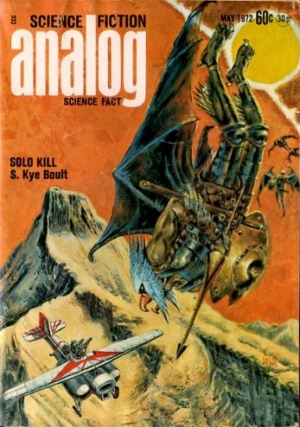Birthday Reviews: Clifford D. Simak’s “Observer”

Clifford D. Simak was born on August 3, 1904 and died on April 25, 1988.
Simak won the Hugo for Best Novelette in 1959 for “The Big Front Yard,” for Best Novel in 1964 for Way Station (a.k.a. Here Gather the Stars), and in 1981 for Best Short Story for “Grotto of the Dancing Deer,” which also won the Nebula Award. He also won a Retro-Hugo in 2014 for the novelette “Rule 18.” His novel City won the International Fantasy Award in 1953. He won the Jupiter Award for the novel A Heritage of Stars. Simak was the Guest of Honor at Noreascon I, the 29th Worldcon, held in Boston in 1971. He was inducted into the First Fandom Hall of Fame in 1973 and in 1977, SFWA named him a Grand Master. He received a Lifetime Achievement Award from the Horror Writer’s Association in 1988.
Simak published “Observer” in the May 1972 issue of Analog Science Fiction/Science Fact, edited by Ben Bova, although it is possible the story was originally purchased by John W. Campbell, Jr. before his death. Simark included it in his 1988 collection Off-Planet and it was reprinted in Eternity Lost, volume 1 of the Stories of Clifford D. Simak published by Darkside Press. The story has most recently been reprinted in the Open Road Media collection of Simak’s work The Big Front Yard and Other Stories
“Observer” appears throughout most of its length to be a story without a human protagonist. The narrator is some sort of sentient who wakes on a planet and begins to figure out where he is and what his purpose is. The story is serious in nature, but the reader can’t help comparing the observer to the unlucky sperm whale called into existence in Douglas Adams’s The Hitch-Hiker’s Guide to the Galaxy.
It also becomes clear to the reader that the observer’s purpose is to check out new planets to determine if they are suitable for human settlement, and it has explored several planets over the years, although it doesn’t recall any of its previous existences. Reading the story in 2018, the sentient’s quest to figure out its purpose seems routine, although it quite possibly was fresh when Simak originally published the story.
The biggest question for a modern reader is the exact nature of the observer. In a modern story, it would be some form of AI, but in a story published in 1972, the observer was more likely to be some sort of robot or computerized probe. Simak eventually does reveal its nature and origin, but does so in a manner that feels anticlimactic and raises more questions than it answers.
Reprint reviewed in the collection Eternity Lost, by Clifford D. Simak, Darkside Press 2005.
 Steven H Silver is a sixteen-time Hugo Award nominee and was the publisher of the Hugo-nominated fanzine Argentus as well as the editor and publisher of ISFiC Press for 8 years. He has also edited books for DAW and NESFA Press. He began publishing short fiction in 2008 and his most recently published story is “Doing Business at Hodputt’s Emporium” in Galaxy’s Edge. Steven has chaired the first Midwest Construction, Windycon three times, and the SFWA Nebula Conference 6 times, as well as serving as the Event Coordinator for SFWA. He was programming chair for Chicon 2000 and Vice Chair of Chicon 7. He has been the news editor for SF Site since 2002.
Steven H Silver is a sixteen-time Hugo Award nominee and was the publisher of the Hugo-nominated fanzine Argentus as well as the editor and publisher of ISFiC Press for 8 years. He has also edited books for DAW and NESFA Press. He began publishing short fiction in 2008 and his most recently published story is “Doing Business at Hodputt’s Emporium” in Galaxy’s Edge. Steven has chaired the first Midwest Construction, Windycon three times, and the SFWA Nebula Conference 6 times, as well as serving as the Event Coordinator for SFWA. He was programming chair for Chicon 2000 and Vice Chair of Chicon 7. He has been the news editor for SF Site since 2002.
Simak remains one of my favorite writers.
I think he was one of the best of the “Golden Age Greats.” He was certainly the most grounded, the most humane.
I love Simak. He is very grounded–but he is also a super-weirdo. There’s almost no Simak story that doesn’t have its awesome “WTF IS HAPPENING?” moments–like the bowling balls in THEY WALKED LIKE MEN, or the saber-tooth tiger chasing the Wheeler in THE GOBLIN RESERVATION, or… (etc). Much of his stuff is on my perpetual-reread list.
I will say I’m not a big fan of his westerns. Unlike Theodore Sturgeon, who wrote some interesting ones, Simak seemed to be a little formulaic when it came to horse opera.
One of my favorite Simak stories is The Trouble With Tycho – it’s one of the most vivid, eerie depictions of the moon ever.